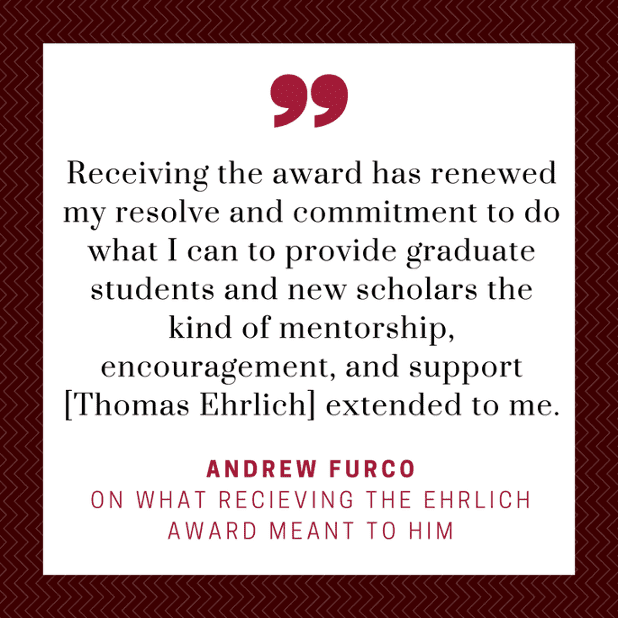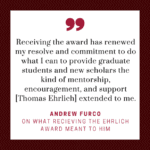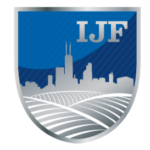Reflections on the Thomas Ehrlich Award by Andrew Furco
The following letter is a guest post by Andrew Furco, Associate Vice-President for Public Engagement and Professor in the Department of Organizational Leadership, Policy and Development at the University of Minnesota. Andrew Furco is the 2012 recipient of the Thomas Ehrlich Civically Engaged Faculty Award.
By Andrew Furco
Receiving the Thomas Ehrlich Award in 2012 was truly an honor. This award, in particular, has meant a great deal to me.
I had the privilege of meeting Dr. Ehrlich in 1992, while a graduate student at UC Berkeley working on my dissertation on service-learning. And meeting him was a turning point for me — one that changed the course of my career.
At the time, I was investigating the role of service-learning in strengthening the motivation and academic engagement of K-12students. Service-learning was just coming onto the radar. There were no books on service-learning and next to no research on the topic. Service-learning lacked definition and theoretical backing. There were no formalized service-learning networks, and there were only one or two national conferences, like the National Service-Learning Conference hosted by the National Youth Leadership Council (NYLC).
My doctoral adviser at the time had highly discouraged me from pursuing a study focused on service-learning, reminding me that there wasn’t a research or literature base on which to pursue my thesis. Asserting that service-learning was just another educational fad, he made it clear that producing a dissertation on service-learning would ruin my career and any chances of securing a position in academia. He recommended that instead, I should study school vouchers because, as he claimed, school choice would be the next important educational policy and reform issue for K-12 education!
Torn about what to do, I grudgingly began to explore the topic of school vouchers, while keeping my eye (and passion) on the then emerging field of service-learning. It was at this time that I had the good fortune of meeting Dr. Ehrlich. I remember the day like it was yesterday. It was a small meeting focused on higher education civic engagement. He wore a pull over sweater and a big smile. He provided a keynote and then engaged us in roundtable style conversation. During the break,he and I chatted a bit and I told him about my struggles with my advisor. He listened patiently, and then put his hand on my shoulder and firmly stated: “You keep at it! What you plan to do with service-learning is important. Don’t let anyone tell you otherwise.” I will never forget that moment. Having spent the prior weeks feeling discouraged and isolated, his words of encouragement and inspiration came at just the right time, and they changed the trajectory of my career, and my life.
With renewed hope, I approached UC Berkeley Professor K. Patricia Cross, in whose course on higher education policy I was enrolled. I shared with her my interest in service-learning, what my advisor had told me, and what Dr. Ehrlich had suggested. She, too, encouraged me not to give up on my research interests in service-learning, and she agreed to be my new advisor. Professor Cross’s genuine support for my research, coupled with Dr. Ehrlich’s encouragement, gave me the freedom to complete a dissertation on the role of school-sponsored community engagement programs in enhancing the education success of high school students.
While working on my dissertation, UC Berkeley received a Learn and Serve demonstration grant in 1994, and I was asked to help establish Berkeley’s new Service-Learning Research and Development Center, which gave me experiences to explore service-learning and broader community engagement issues at the higher education level. This work led to my serving on the faculty of Berkeley’s Graduate School of Education. And then 14 years later, I left Berkeley in 2008 to assume the role of Associate Vice President for Public Engagement at the University of Minnesota, where I also serve as Professor of Higher Education in the Department of Organizational Leadership, Policy and Development.
I think about where I stand today, and what I experienced as a graduate student. I think about how I almost left the field of service-learning and community engagement because I was told I would never get a job in academia and my career would be ruined if I continued to pursue studies of service-learning. I have more than once wondered what my trajectory would have been had I not crossed paths with Thomas Ehrlich and K. Patricia Cross.
From them, I learned first-hand that although it may difficult and risky for young scholars to conduct research on new and emerging topics for which there is a weak and limited research base, following one’s curiosity, passion, and instincts is what ultimately sustains us.
Over the years, I relied much on Dr. Ehrlich’s words of encouragement as I, like others who study and practice service-learning and community engagement issues, have had to fight for the legitimacy and value of our scholarly work. Today, I make sure to encourage my graduate advisees and junior faculty to follow their passions and interests. I try to model what he and Dr. Cross did for me when I needed mentorship and support.
I know that I would not be in my current position, doing the work that I do, had it not been for Dr. Ehrlich and his genuine words of encouragement all those years ago. This is why receiving the Thomas Ehrlich Civically Engaged Faculty Award 20 years after that pivotal encounter has meant so much to me. Seeing the award plaque in my office reminds me every day how he enriched my career and influenced my life in profound ways. Receiving the award has renewed my resolve and commitment to do what I can to provide graduate students and new scholars the kind of mentorship, encouragement, and support he extended to me.
To nominate a civically engaged scholar, visit this page.
 Campus Compact Blog
Campus Compact Blog 



